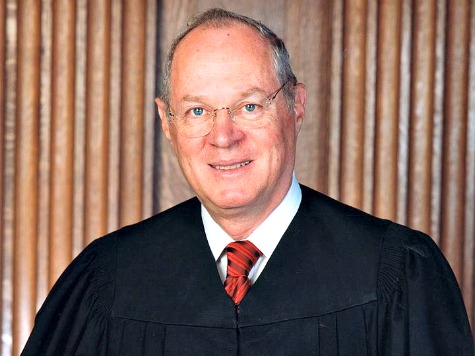
President Obama’s Solicitor General Donald Verrilli said two things in Court Wednesday that may swing Justice Anthony Kennedy one way or the other on whether to uphold or strike down Section 3 of the Defense of Marriage Act (DOMA).
DOMA is the 1996 law that defines marriage for federal law and federal programs as one man and one woman, and it is the legislation under review in U.S. v. Windsor, the Supreme Court case argued today.
It’s worth noting that there is a significant chance the justices could throw out the whole case for lack of jurisdiction. It’s also possible that you could have a 4-4 split on whether DOMA violates the equal-protection guarantee of the Fifth Amendment, and have Kennedy cast the deciding vote to strike it down under a completely different theory that DOMA violates federalism by interfering with state sovereignty on marriage.
But if it’s decided on equal protection grounds, Verrilli said one thing that could doom DOMA, and one other thing that might save it by accident.
Verrilli argued that DOMA would survive what is called “rational-basis review,” but it would instead fall under another term called “intermediate scrutiny.” The first is the default rule that is usually all the Constitution requires for “equal protection,” that laws impacting different people differently (which many laws do) need only be rationally related to advancing some legitimate public interest in order to be constitutional. The second is a rule that applies to groups that are defined by an unchangeable characteristic and cannot vindicate their rights through the political process.
The woman who brought this lawsuit, Edith Windsor, argues along with most of the gay rights community that DOMA fails because it has no rational basis. In other words, when a supermajority of Democrats and Republicans in both the House and Senate voted for DOMA–and Democrat Bill Clinton signed it–they were literally irrational. They were driven by fear or animus–meaning malicious hostility or even hatred.
It’s always been unlikely that Kennedy would buy that argument that Congress and Clinton were just a bunch of haters, and this law is about nothing more. So Verrilli argued that they voted for it because of a lack “of careful reflection or an instinctive response to a… group of people who we perceive as [different].” That could actually work with Kennedy, to disavow that elected leaders are literally irrational and hostile, and instead say they rashly voted for it out of ignorance.
But Verrilli also acknowledged–as he did in his brief–that Congress reasonably thought DOMA promoted legitimate public interests. Only under the heightened requirements of intermediate scrutiny, requiring the law to significantly advance important public interests, should the Court strike it down.
So if Kennedy sticks to his standard in earlier gay rights cases–notably Romer v. Evans in 1996 and Lawrence v. Texas in 2003–both of which failed under this minimal rational-basis test, then he could be the fifth vote to save DOMA. Or he could conclude that Congress and well-meaning, but nonetheless ignorant, and deficient because it fails to serve important public interests.
The ball is in Kennedy’s court, and Verrilli may have passed him the ball with the option of scoring for either team.
Breitbart News legal columnist Ken Klukowski filed a brief for social scientists in the Supreme Court’s marriage litigation.

COMMENTS
Please let us know if you're having issues with commenting.